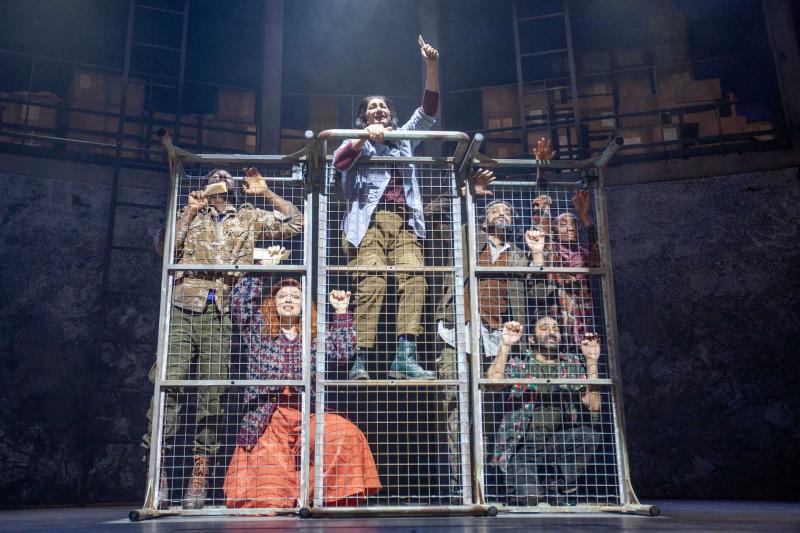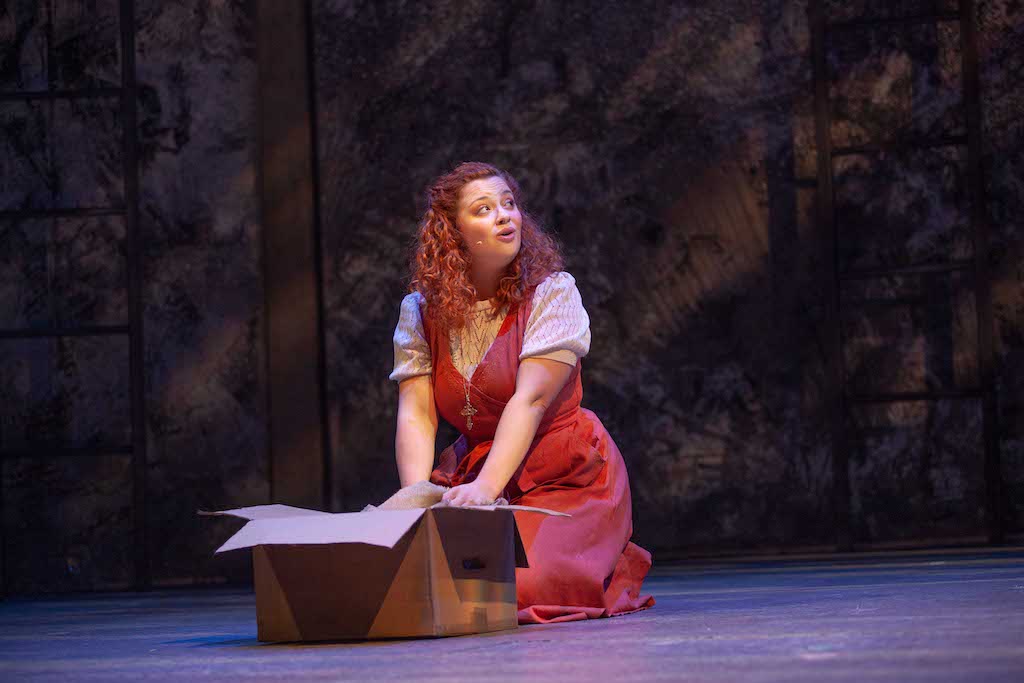The Caucasian Chalk Circle, Rose Theatre review - new production of classic proves a gruelling experience | reviews, news & interviews
The Caucasian Chalk Circle, Rose Theatre review - new production of classic proves a gruelling experience
The Caucasian Chalk Circle, Rose Theatre review - new production of classic proves a gruelling experience
Carrie Hope Fletcher one of few bright sparks in a tough evening for the audience

Brecht – as I suppose he intended – is always a shock to the system.
This new production, the first in London for 25 years, opens on a present day refugee camp, displaced people squabbling over who gets to go home first and what support they can expect when they get there. The names (and the play’s title) suggest the Caucasus, so has the conflict between Azerbaijan and Armenia flared up again? But the names are Georgian, so are we in a future in which Russia has invaded that tiny fearful republic once again? Or is the story more universal and we’re at liberty to consider our desperate men and women as any individuals running from conflicts longing to return home?
 One can see why the framing device isn’t always used because such thoughts are still in mind well after The Singer (Zoe West) turns up, the bickering stops and the play-within-a-play begins. Director, Christopher Haydon, has chosen not to use the traditional banners to introduce each episode and does not to keep all his actors and stagehands in plain sight, so the comforts of Brecht’s more obvious non-naturalistic paradigm are denied us and we take more time orienting ourselves to all these characters coming and going. There are more than 50 for the nine actors to create and some of the short cuts used to meet that considerable challenge don’t work. There’s the singing too, but much of it is done initially by The Singer to her own accompaniment and, inescapably, it feels a little like a busker has decamped from the high street and is working the room.
One can see why the framing device isn’t always used because such thoughts are still in mind well after The Singer (Zoe West) turns up, the bickering stops and the play-within-a-play begins. Director, Christopher Haydon, has chosen not to use the traditional banners to introduce each episode and does not to keep all his actors and stagehands in plain sight, so the comforts of Brecht’s more obvious non-naturalistic paradigm are denied us and we take more time orienting ourselves to all these characters coming and going. There are more than 50 for the nine actors to create and some of the short cuts used to meet that considerable challenge don’t work. There’s the singing too, but much of it is done initially by The Singer to her own accompaniment and, inescapably, it feels a little like a busker has decamped from the high street and is working the room.
Grusha, a maid, has rescued a baby boy left behind when her mother, the governor’s wife, flees a city disintegrating during conflict. As heir, the baby’s life is endangered by different factions, so Grusha heads for the mountains, her bond with the child strengthening as they deal with the chaos in the countryside and the friends and foes (mainly foes) they run into. Ultimately, she faces a kangaroo court (there is no other kind in this place – nor in ours, the implication) and her love goes up against the governor’s wife’s blood in the circle of the title. Who is the real mother in such circumstances?
Adapter, Steve Waters, does not compromise on our comfort. The first half is a long haul – 90 minutes – and the songs are not a great relief, Michael Henry’s melodies largely lacking in catchy hooks and, with just a strumming guitar to work with, they soon irritate as much as they entertain. The exception, as one would expect, comes when Carrie Hope Fletcher’s Grusha (pictured above) sings and her emotional turmoil emerges fully into the light. But, alas, her wonderful voice is severely underused.
Taking a deep breath to return for the second half – the show runs to a demanding, some might say indulgent, three hours including the interval - much needed comic relief is provided by the sardonic wit of Jonathan Slinger’s Azdak, the only literate man in the town and, via an unlikely turn of events including his rescue from the gallows, the judge for the court convened to decide on the fate of the child. It’s in the character of Azdak that the power of regularly breaking the fourth wall, of treating wholly absurd situations as serious, of language to turn minds, becomes evident, Slinger milks it of course, but to winning effect, eliciting his fair share of laughs from the house.
Though it’s a tough proposition to bring forward so many characters from a relatively small pool of actors, it’s disappointing that regional accents (many very wobbly) are still used as markers of an unsophisticated proletariat. We get that this is a country populated by peoples with different histories and interests, maybe even different ethnicities, but it’s such a hackneyed device to use in 2022.
While it’s good to know that, even in these most financially straitened of times, a mid-sized, off-West End house like the Rose Theatre can mount its own production of a monument of Brechtian theatre, it’s disappointing to discover that it’s so tough to love. It really doesn’t have to be this hard.
rating
Explore topics
Share this article
Add comment
The future of Arts Journalism
You can stop theartsdesk.com closing!
We urgently need financing to survive. Our fundraising drive has thus far raised £49,000 but we need to reach £100,000 or we will be forced to close. Please contribute here: https://gofund.me/c3f6033d
And if you can forward this information to anyone who might assist, we’d be grateful.

Subscribe to theartsdesk.com
Thank you for continuing to read our work on theartsdesk.com. For unlimited access to every article in its entirety, including our archive of more than 15,000 pieces, we're asking for £5 per month or £40 per year. We feel it's a very good deal, and hope you do too.
To take a subscription now simply click here.
And if you're looking for that extra gift for a friend or family member, why not treat them to a theartsdesk.com gift subscription?
more Theatre
 Edinburgh Fringe 2025 reviews: Ordinary Decent Criminal / Insiders
Two dramas on prison life offer contrasting perspectives but a similar sense of compassion
Edinburgh Fringe 2025 reviews: Ordinary Decent Criminal / Insiders
Two dramas on prison life offer contrasting perspectives but a similar sense of compassion
 Edinburgh Fringe 2025 reviews: Kinder / Shunga Alert / Clean Your Plate!
From drag to Japanese erotica via a French cookery show, three of the Fringe's more unusual offerings
Edinburgh Fringe 2025 reviews: Kinder / Shunga Alert / Clean Your Plate!
From drag to Japanese erotica via a French cookery show, three of the Fringe's more unusual offerings
 The Two Gentlemen of Verona, RSC, Stratford review - not quite the intended gateway drug to Shakespeare
Shakespeare trying out lots of ideas that were to bear fruit in the future
The Two Gentlemen of Verona, RSC, Stratford review - not quite the intended gateway drug to Shakespeare
Shakespeare trying out lots of ideas that were to bear fruit in the future
 Edinburgh Fringe 2025 reviews: The Horse of Jenin / Nowhere
Two powerful shows consider the Israeli-Palestinian conflict, with mixed results
Edinburgh Fringe 2025 reviews: The Horse of Jenin / Nowhere
Two powerful shows consider the Israeli-Palestinian conflict, with mixed results
 Edinburgh Fringe 2025 reviews: The Fit Prince / Undersigned
A joyful gay romance and an intimate one-to-one encounter in two strong Fringe shows
Edinburgh Fringe 2025 reviews: The Fit Prince / Undersigned
A joyful gay romance and an intimate one-to-one encounter in two strong Fringe shows
 Tom at the Farm, Edinburgh Fringe 2025 review - desire and disgust
A visually stunning stage re-adaptation of a recent gay classic plunges the audience into blood and earth
Tom at the Farm, Edinburgh Fringe 2025 review - desire and disgust
A visually stunning stage re-adaptation of a recent gay classic plunges the audience into blood and earth
 Works and Days, Edinburgh International Festival 2025 review - jaw-dropping theatrical ambition
Nothing less than the history of human civilisation is the theme of FC Bergman's visually stunning show
Works and Days, Edinburgh International Festival 2025 review - jaw-dropping theatrical ambition
Nothing less than the history of human civilisation is the theme of FC Bergman's visually stunning show
 Every Brilliant Thing, @sohoplace review - return of the comedy about suicide that lifts the spirits
Lenny Henry is the ideal ringmaster for this exercise in audience participation
Every Brilliant Thing, @sohoplace review - return of the comedy about suicide that lifts the spirits
Lenny Henry is the ideal ringmaster for this exercise in audience participation
 Edinburgh Fringe 2025 reviews: The Beautiful Future is Coming / She's Behind You
A deft, epoch-straddling climate six-hander and a celebration (and take-down) of the pantomime dame at the Traverse Theatre
Edinburgh Fringe 2025 reviews: The Beautiful Future is Coming / She's Behind You
A deft, epoch-straddling climate six-hander and a celebration (and take-down) of the pantomime dame at the Traverse Theatre
 Good Night, Oscar, Barbican review - sad story of a Hollywood great's meltdown, with a dazzling turn by Sean Hayes
Oscar Levant is an ideal subject to refresh the debate about media freedom
Good Night, Oscar, Barbican review - sad story of a Hollywood great's meltdown, with a dazzling turn by Sean Hayes
Oscar Levant is an ideal subject to refresh the debate about media freedom
 Edinburgh Fringe 2025 reviews - Monstering the Rocketman by Henry Naylor / Alex Berr
Tabloid excess in the 1980s; gallows humour in reflections on life and death
Edinburgh Fringe 2025 reviews - Monstering the Rocketman by Henry Naylor / Alex Berr
Tabloid excess in the 1980s; gallows humour in reflections on life and death
 Edinburgh Fringe 2025 reviews: Lost Lear / Consumed
Twists in the tail bring revelations in two fine shows at the Traverse Theatre
Edinburgh Fringe 2025 reviews: Lost Lear / Consumed
Twists in the tail bring revelations in two fine shows at the Traverse Theatre

Comments
This review appears to have
I'm not sure what Cole's
I'm not sure what Cole's Notes are (is?). I'm glad you liked it and will go again - but differences of opinion are allowed, even encouraged, by theatre. You liked it, I didn't.
My obligation is to make my case in my review, to be fair to the production and to be fair to readers - and do so in an engaging way. The coincidence with others' assessments is not material.